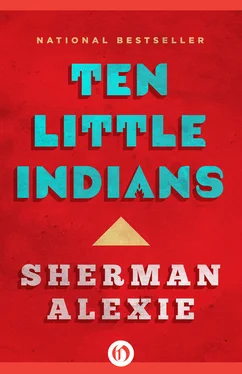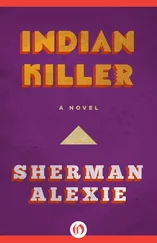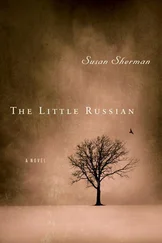“Mom,” Frank said. “Show me something new.”
So Helen dribbled the ball toward the hoop, dribbled across the key, and shot a rolling left-handed hook that bounced around the rim and dropped in.
“Oh, sweetie! I love you!” Harrison shouted from the grass and sprayed chicken and banana into the air. “That was her favorite move, son, she never missed that one! And nobody ever stopped it. Hell, I never stopped it!”
“Do it again,” Frank said.
So Helen shot the left-handed hook again. She shot it twenty times and made nineteen of them.
“She’s beautiful!” Harrison shouted and ran to join his wife and son on the court. “Isn’t she beautiful?”
Frank wondered if this was the best day of his whole life so far, if he would ever be this happy again. Those were extreme thoughts for an eleven-year-old, and Frank, though he was that eleven-year-old, understood he was being extreme, but it was the only way he knew how to be. It was the only way he’d been taught to be.
So mother, father, and son played basketball for hours, until it got dark enough for the streetlights to blink on, until it was too dark for even the streetlights to make any difference, until Frank could barely keep his eyes open, until Helen and Harrison took their exhausted son home and put him to bed and watched him sleep and breathe, and inhale and exhale and inhale and exhale.
On the first anniversary of his father’s death, Frank stepped outside to see what kind of day it was. He cursed the rain, stepped back inside to grab his windbreaker, and walked to the covered courts over on Rainier Avenue. On a sunny day, fifty guys played at Rainier, but on that rainy day, Preacher was shooting hoops all by himself; he was always shooting hoops by himself. Two or three hundred set shots a day. One day a month, he closed his eyes and shot blindly and would never reveal why he performed such an eccentric ceremony.
“Honey, honey, honey,” Preacher always said when asked. “Just let the mystery be.”
On that day, Preacher’s eyes were wide open when Frank joined him for a game of Horse.
“Hey, Frank Snake Church, what ever happened to you?” Preacher asked. He always asked variations of the same question when he saw Frank. “Tell me, tell me, tell me, what ever happened to Frank Snake Church, what the hell happened to Benjamin Franklin Snake Church?”
Preacher hit a thirty-foot bank shot, but Frank missed it. Preacher hit a left-handed hook shot from half-court, but Frank threw the ball over the basket.
“Look at me,” said Preacher. “I’m a senior citizen and I’ve given Frank the ‘H’ and the ‘O.’ Ho, ho, ho, Merry Christmas. But wait, I must stop and ponder this existential dilemma. How could I, a retired blue-collar worker, a fixed-income pensioner, a tattered coat upon a stick, how could I be defeating the legendary Frank Snake Church? What the hell is wrong with this picture? What the hell ever happened to Frank Snake Church?”
“I am Frank Snake Church in the here and now and forever,” Frank said and laughed. He loved to listen to Preacher rant and rave. A retired railroad engineer, Preacher was a gray-haired black man with a big belly. He stood at the top of the key, bounced the ball off the free-throw line, and off the board into the hoop.
“That was a garbage shot,” Frank said. “You’d never take that shot in a real game. Never.”
“Every game is real, every game is real, every game is real,” Preacher chanted as Frank missed the trick shot.
“That’s a screaming scarlet ‘R’ for you,” said Preacher and called out his next shot. “This one is all net all day.”
Preacher hit the fifteen-foot swish, and Frank also swished it.
“Oh, a pretty little shot by the Indian stranger,” said Preacher.
“I ain’t no stranger, I am Frank Snake Church.”
“Naw, you ain’t no Frank Snake Church,” Preacher said. “I saw Frank Snake Church score seventy-seven against the Ballard Beavers in 1979. I saw Frank Snake Church shoot twenty-eight for thirty-six from the field and twenty-one for twenty-two from the line. I saw Frank Snake Church grab nineteen rebounds that same night and hand out eleven dimes. Yeah, I knew Frank Snake Church. Frank Snake Church was a friend of basketball, and believe me, you ain’t no Frank Snake Church.”
“My driver’s license says I’m Frank Snake Church.”
“Your social security card, library card, unemployment check, and the tattoo on your right butt cheek might say Frank Snake Church,” Preacher said, “but you, sir, are an imposter; you are a doppelgänger; you are a body snatcher; you are a pod person; you are Frank Snake Church’s evil and elderly twin is what you are.”
Preacher closed his eyes and hit a blind shot from the corner. Frank closed his eyes and missed by five feet.
“That’s an ‘S’ for you, as in Shut Up and Learn How to Play Another Game,” said Preacher. “God could pluck out my eyes, and you could play with a microscope, and I’d still beat you. Man, you used to be somebody.”
“I am now what I always was,” Frank said.
“You now and you then are two entirely different people. You used to be Frank the Snake, Frank the Hot Dog, but now you’re just a plain Oscar Mayer wiener, just a burned-up frankfurter without any damn mustard to make you taste better, make you easier to swallow. I watch you toss up one more of those ugly jumpers, and I’m going to need the Heimlich to squeeze your ugliness out of my throat.”
“Nope, Frank now and Frank then are exactly the same. I am a tasty indigenous sausage.”
“You were young and fresh, and now you’re prehistoric, my man, you’re only about two and a half hours younger than the Big Bang, that’s how old you are. And I know you’re old because I’m old. I smell the old on you like I smell the old on me. And it reeks, son, it reeks of stupid and desperate hope.”
Preacher hit a Rick Barry two-handed scoop-shot free throw.
“I can’t believe you took that white-boy shot,” Frank said. “I’m going to turn you in to the NAACP for that sinful thing.”
“Honey, I believe in the multicultural beauty of this diverse country.”
“But that Anglo crap was just plain ugly.”
“Did it go in?” Preacher asked.
“Well, it went in, but it didn’t go in pretty.”
“All right, pretty boy, let’s see what you got.”
Frank clanged the shot off the rim.
“My shot might’ve been ugly,” Preacher said, “but your shot is missing chromosomes. You want me to prove it, or you want to lose this game all by yourself?”
“Here begins my comeback,” said Frank as he took the shot and missed again.
“Spell it out, honey, that’s ‘H-O-R-S’ and double ‘E.’ Game over.”
“Man, I can’t believe I lost on that old-fashioned antique.”
“Sweetheart, I might be old-fashioned, but you’re just plain old.”
Frank felt hot and stupid. He tasted bitterness — that awful need to cry — and he was ashamed of his weakness, and then he was ashamed of being ashamed.
“Age don’t mean anything,” Frank said. “I walk onto any court on this city, and I’m the best baller. Other guys might be faster or stronger, maybe they jump higher, but I’m smarter. I’ve got skills and I’ve got wisdom.”
Frank’s heart raced. He wondered if he was going to fall again; he wondered if lightning was going to strike him again.
“You might be the wisest forty-year-old ballplayer in the whole city,” Preacher said. “You might be the Plato, Aristotle, and Socrates of Seattle street hoops, but you’re still forty years old. You should be collecting your basketball pension.”
“You’re twenty years older than me,” Frank said. “Why are you giving me crap about my age?”
Читать дальше












